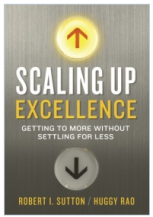REVIEW: SCALING UP EXCELLENCE BY SUTTON & RAO
/ I often reference Bob Sutton’s work here and in class, and Huggy Rao’s work on enthusiast organizations and innovation is a classic. When I heard that their book, Scaling Up Excellence: Getting to More Without Settling for Less, was due out I was thrilled, and rightly so. It’s wonderful.
I often reference Bob Sutton’s work here and in class, and Huggy Rao’s work on enthusiast organizations and innovation is a classic. When I heard that their book, Scaling Up Excellence: Getting to More Without Settling for Less, was due out I was thrilled, and rightly so. It’s wonderful.
Sutton and Rao offer a comprehensive guide to management in a package of enticing stories, subtly supported by references to high-end research. Their personal history in the Silicon Valley and their global access to interesting organizations provides the backdrop.
Main Theme & Who Should Read
The main theme is that, while many good practices exist in organizations, they either get lost or there are difficulties when attempts are made to spread them (scale them) across the organization. The breadth of this theme means that this book will provide value to anyone who would like to see organizations improve. The benefits are not limited by industry, functional area, or organizational size.
Key Ideas: The Seven Mantras
Sutton and Rao are far more direct than most academics; it often takes a lot to get a professor away from an “it depends” answer. In this instance they have enough background to be confident with the following:
We’ve identified reliable signs that scaling is going well or badly, and we’ve distilled these signals into seven mantras. If you are embarking on a scaling effort [I’ll add if you are doing anything to make your organization better], memorize them, teach them to others, and invent ways to keep them firmly in focus -- especially when the going gets rough.
- Spread a mindset, not just a footprint. This first one is their, and your, protection against being labeled a fad.
- Engage all the senses. From my perspective, this is where you consider how to weave together human, technical, and organizational practices such that they work together, not against your goals. It’s also where I realize that my presentation of these ideas is much less colorful, and perhaps less likely to scale.
- Link short-term realities to long-term dreams. Organizations that can do this have mastered ambidexterity -- the ability to both get work done now, and not let that get in the way of great things in the future. (In my mind, this is a precursor to solving the The Innovator's Dilemma.)
- Accelerate accountability. This one sings to me as a focus on transparency. I’ve asked in the past, “What evidence, tools, and techniques do people in mainstream organizations think they need to move in this direction?” The examples provided here may move us closer to my ideal.
- Fear the clusterfug. Yes, they are using a euphemism, but it gets across that we can't allow even mundane bad things to get worse. Speak up. For those wanting to use their business research background: Don’t escalate commitments to bad situations. Think about the Denver baggage-handling fiasco and fear a similar outcome on your watch.
- Scaling requires both addition and subtraction. This ties directly to the idea of managing for now and for the future. Sometimes activities that have worked to create excellence stop working as you scale. As Sutton and Rao note, having an all-hands meeting every week makes great sense for a small organization, but you are likely to have to shift the form of this activity as you grow. Information flow and commitment are still important, but you need to be willing to find new ways that fit your growth.
- Slow down to scale faster--and better-- down the road. I completely agree. I am wondering why, in my writing, I start with this one (in the form of “Stop-Look-Listen”), and yet they end with it. Perhaps thinking of this as a list is the problem. It’s not a list, it’s a cycle or a weaving, which also goes along with their borrowing Michael Dearing’s image of whether this is Buddhism versus Catholicism (see Chapter 2).
Apply These Ideas
My goal with this review is to get you to read the book. You will benefit. Your organization will benefit. The next time I teach a general graduate management class, Scaling Up Excellence will be a required reading.
I’m still trying to decide how much experience in organizations you need to have to gain value from their ideas -- and I’d love your opinion. Is this a book to help undergraduates trying to understand the complexities of organizations? If you are a mentor, is this a book you would suggest to a person in their first full-time job? Without a doubt it’s a book I’d give to someone taking on a new leadership role at any level.
Disclosure: My review copy was provided by the publisher. I’ve also purchased a copy to gift to a colleague.






